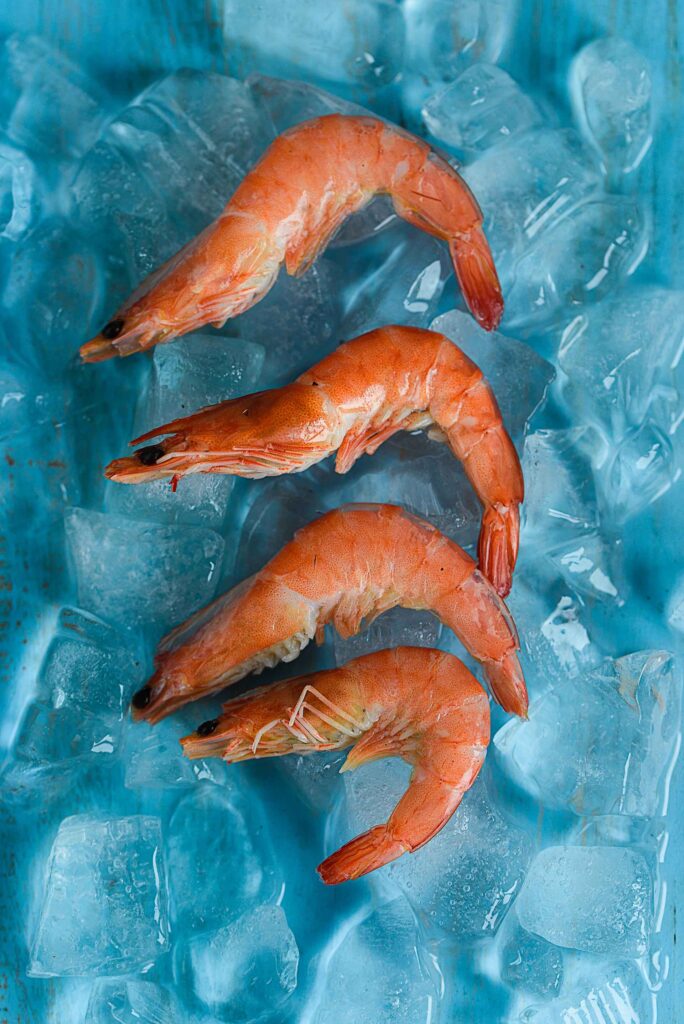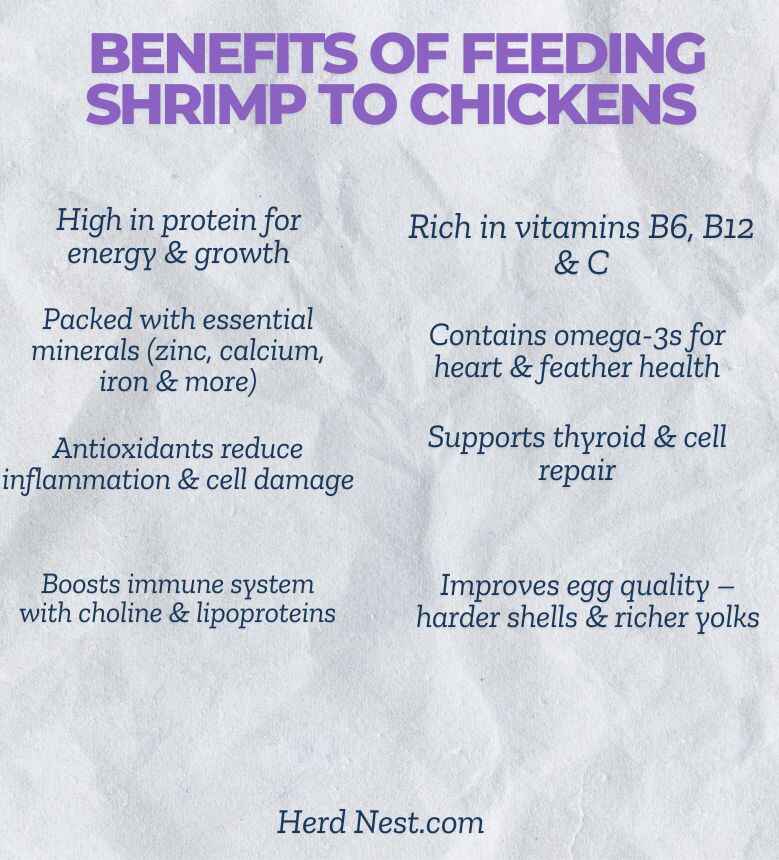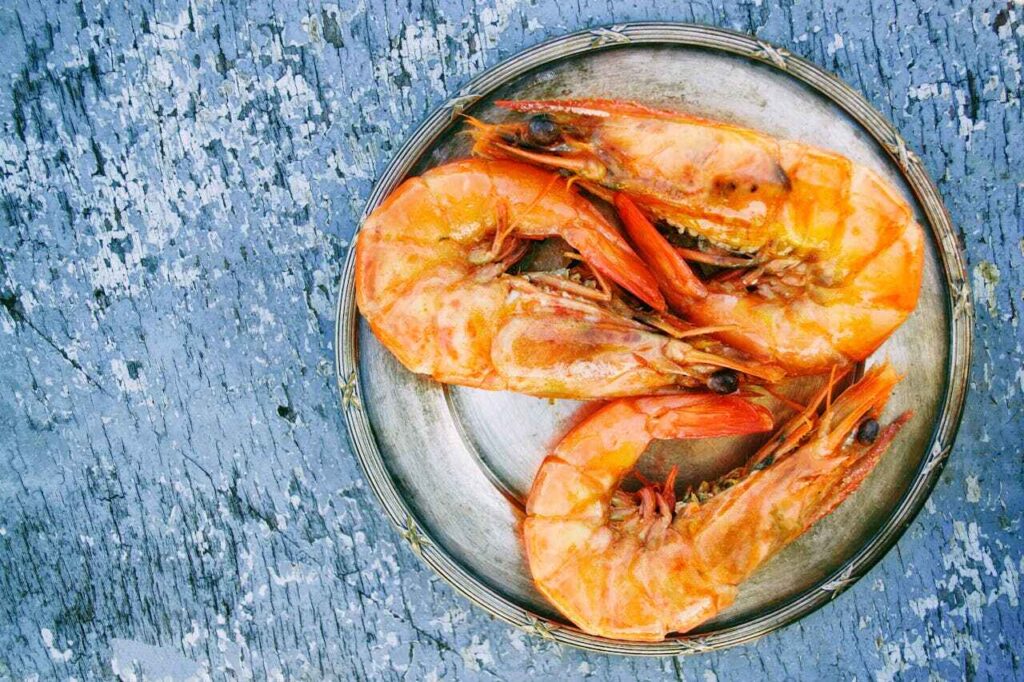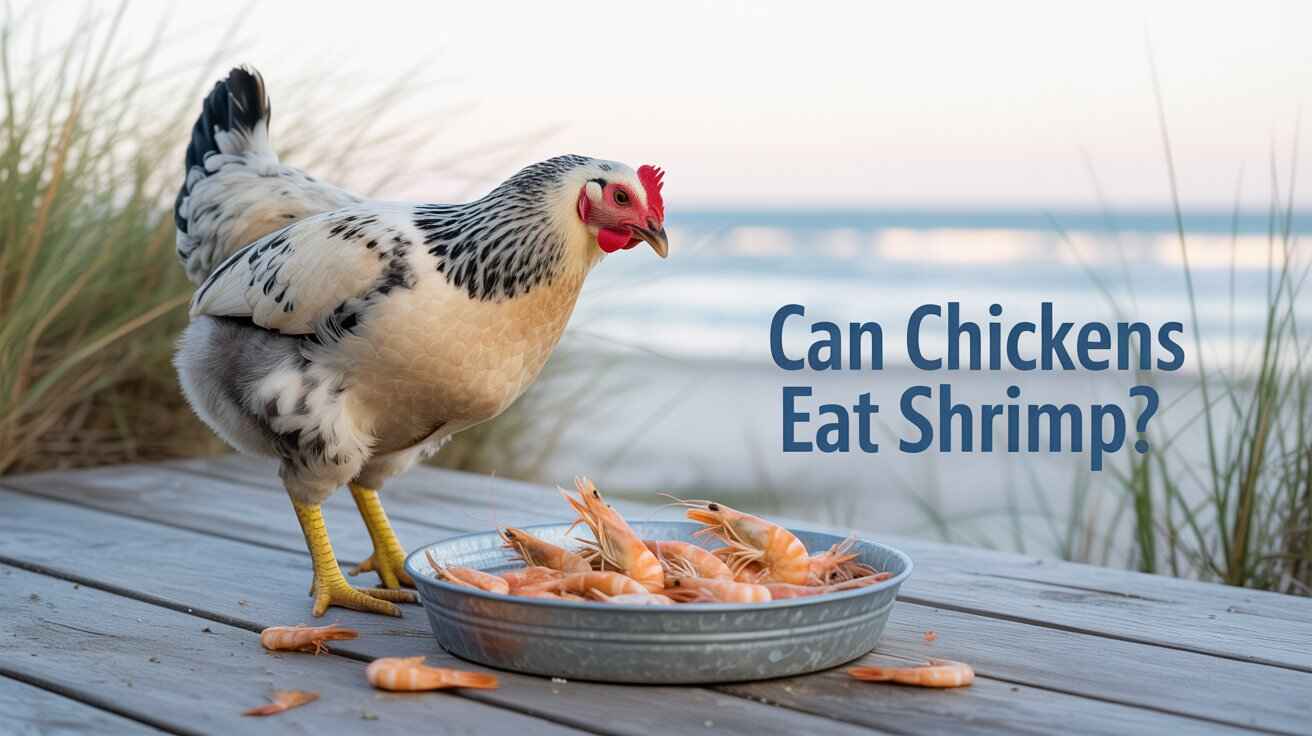When it comes to feeding chickens, the idea of giving them shrimp may sound a bit strange, but it’s a topic worth exploring. As a chicken keeper myself, I’ve heard the common saying that chickens will eat almost anything, and I’ve often wondered if this includes seafood like shrimps.
After a bit of discussion with other keepers and some trial and error, I discovered that chickens not only enjoy shrimp but seem to love it so much they’ll even fight over it!
Shrimps is a great source of protein and essential nutrients, which makes them a healthy option as an occasional treat. However, it’s important to consider how often you feed shrimp, as too much of a good thing isn’t always ideal.
The sound advice I’ve followed is to introduce shrimp sparingly into their diet to keep things balanced. If you’re looking to spice up their meals, shrimp can be a delightful way to find variety while keeping your chickens happy and well-fed.

Table of Contents
ToggleCan Chickens Eat Shrimp?
Chickens can absolutely eat shrimp, and they often enjoy this tasty food. Shrimp is a source of protein, nutrients like selenium, phosphorus, and iodine, and contains low fat, making it a healthy addition to their diet when fed in moderation.
However, the selectivity in feeding shrimp is essential because it may have some drawbacks. For instance, shrimp shells, while edible, can be difficult for some chickens to digest and might cause digestive issues like impaction in their gastrointestinal tract.
Wild-caught shrimps should also be handled carefully, as they might contain parasites or contaminants, which could be unsafe for your flock.
As a chicken keeper, I’ve learned that shrimp waste or meal can replace soybeans as a protein source in some poultry feed, especially in areas like Central America where the shrimp industry thrives.
Air-dried shrimp waste is a great alternative, but it’s important to consider its abundance in the feed since too much can have a detrimental effect on egg-laying performance or growth. Adding shrimp as an occasional treat is beneficial, but you should always keep in mind the potential arguments for and against its use and ensure it complements your chickens’ balanced diet.
How to Serve Shrimp to Your Flock
Chickens absolutely enjoy shrimp as a treat, and they’ll often fight for every last bit. You can serve them cooked, raw, steamed, or even boiled.
The tails, shells, and dried shrimp are great options, but avoid anything that’s fried, seasoned, or cooked with butter, oil, salt, garlic, or onions, as these can be harmful to their health. For variety, you can even crush up the shrimp shells and add them to healthy snacks like broccoli or pickled beets.
When preparing shrimp for your flock, make sure it’s clean and free of harmful bacteria. Whiteleg Shrimp, Pink Shrimp, Giant Tiger Prawn, and Brown shrimp—all part of the Crustacean family—are suitable.
Just break the shrimp into small pieces to prevent choking and ease their consumption. Feeding shrimp in moderation ensures a balanced diet and avoids potential illness, such as diarrhea or vomiting. If you notice any issues, consult a veterinarian for advice on safe feeding practices.

Benefits of Feeding Shrimp to Chickens
Feeding chickens shrimp offers plenty of nutritional benefits, making it an excellent supplement for their diet plan. Shrimp is packed with proteins, vitamins like vitamin B6, vitamin B12, and vitamin C, as well as essential minerals like selenium, iron, zinc, calcium, phosphorus, and magnesium.
The presence of omega-3 fatty acids, fats, and antioxidants such as astaxanthin can significantly improve the overall health of your flock. These nutrients support cell repair, enhance the thyroid gland‘s ability to produce hormones, and even reduce inflammation and prevent cell damage.
Additionally, shrimp contains choline, cholesterol, and beneficial lipoproteins, which contribute to healthier birds and a stronger immune system.
Adding shrimp to their diet also boosts the quality of their eggs, leading to higher-quality eggs with harder shells and richer yolks. Since shrimp is a nutrient-dense food, it can help reduce reliance on commercial feed, saving both money and frequent refills.
Watching your flock enjoy the tasty morsels is pure entertainment as they peck away with their little beaks, making it a fun and practical addition to their meals. With multiple studies and proven biochemical evidence backing these benefits, shrimp is an excellent way to support your flock’s growth and well-being.

Are There Any Disadvantages of Feeding Shrimp to Chickens?
Feeding shrimp to chickens can have some challenges. For starters, raw shrimp or wild-caught shrimp might contain parasites or pose food safety concerns, like salmonella or bacterial contamination, which could affect their health.
Experts suggest thoroughly cooking shrimp to avoid potential risks. Additionally, the shells can be hard for birds to digest, possibly leading to digestive issues like diarrhea or vomiting. Care must also be taken with the shrimp meal, as lower-quality sources or high levels of inclusion may create detrimental effects on your flock’s well-being.
While shrimp meal has been used successfully as a protein source, researchers in Japan found that using shrimp waste at high levels, such as 8% or more of the daily meal, decreased feed efficiency and body weight in broilers. However, keeping it to a safe level, like 4%, showed no such negative outcomes.
For laying hens, some studies report benefits like increased egg yolk pigmentation measured on the Roche yolk color fan scale but no notable improvement in egg quality, egg production, or specific gravities. This suggests that shrimp is best used as a supplement, not a replacement for primary feeds like soybeans.
For older laying hens or aged birds, a formic acid-treated shrimp meal has been found to improve eggshell quality and result in darker yolks while maintaining protein intake.
In a 2018 experiment with 56 Leghorns, daily feed with formic acid provided additional nutrients without adverse effects. The astaxanthin in shrimp, known for its antioxidant properties, also contributed to these results.
Although feeding shrimp to your flock offers several beneficial nutrients like omega-3 fatty acids, calcium, and proteins, it is important to ensure proper preparation and balance in their diet to avoid risks.
Can You Give Shrimp Shells to Chickens?
Yes, you can give shrimp shells to chickens, and it can actually be quite beneficial if done in moderation. The calcium found in shrimp shells supports strong bones and healthy feathers, which are vital for their growth and overall health.
Adding shrimp shell powder to their feed can also provide additional protein and nutrients that benefit your flock‘s development. However, there are some cons, as too much shrimp shell supplementation might cause an imbalance in minerals, particularly phosphorus, which can lead to issues like egg binding or metabolic bone disease.
To ensure your poultry stays healthy, always consult a veterinarian before incorporating seafood-based supplements into their dietary plan.
Can Chickens Eat Shrimp Tails?
Yes, chickens can eat shrimp tails, and their digestive system is capable of breaking down this type of seafood. However, it’s essential to practice portion control to avoid any negative effects on their health, such as diarrhea or weight gain.
While shrimp tails provide essential nutrients, they lack the vitamins and minerals found in other foods like fruit and vegetables. For a balanced diet, it’s important to include a variety of foods alongside seafood to ensure your chickens stay healthy and thrive.
Can Baby Chicks Eat Shrimp?
Feeding baby chicks shrimp can spark debate, as opinions differ widely. Some argue that shrimp provides protein, vitamins, and other beneficial nutrients that support growth and development for young birds with unique nutritional needs.
However, others emphasize potential risks such as salmonella contamination, illness, and the presence of heavy metals like mercury or lead, which can harm chicks if ingested.
Additionally, shrimp’s high cholesterol content could increase the risk of heart disease in certain breeds. For safety, many recommend avoiding seafood or table scraps for chicks under three weeks old and exercising caution when introducing new foods, leaving the choice up to personal preference.
Can Chickens Eat Prawns?
Yes, chickens can eat prawns, but there are a few things to consider. Since chickens are omnivores, they can digest both plant and animal matter, including seafood like prawns. It’s important to only feed them cooked prawns, as raw prawns may contain harmful bacteria that could make them sick.
For smaller breeds like bantams and silkies, chop prawns into smaller pieces for easier eating, while larger breeds like Orpingtons or Brahmas can handle larger portions.
Feeding prawns in moderation (about 5-10% of their daily diet) helps maintain a balanced diet, preventing nutritional deficiencies, obesity, or an unbalanced diet. This ensures your flock stays healthy, gets the essential nutrients they need, and remains happy.
Can Chickens Eat Seafood?
Yes, chickens can enjoy seafood as part of their diet, and it can be a great way to provide them with essential vitamins, minerals, and protein. Small fish like minnows, whitebait, and anchovies are easy for your feathered friends to digest and make excellent aquatic treats.
Similarly, mollusks such as clams, mussels, snails, and oysters are safe but only when properly cooked or steamed. Feeding raw seafood may introduce bacteria or parasites that could be harmful to your flock.
Gutting the fish before feeding helps eliminate risks and ensures your birds get a healthy dose of nutrients without danger. To keep your flock happy and thriving, moderation and proper preparation are key.
Final Thoughts
Chickens can enjoy shrimp as a special treat, but it’s important to serve it in small amounts and with proper preparation. Shrimp is packed with protein, essential amino acids, vitamins, and minerals, making it a highly beneficial addition to your flock’s diet.
However, moderation is key, as too much shrimp or shrimp waste meal could lead to health concerns like excess fat or an imbalance in their nutrition. Always cook shrimp thoroughly and avoid serving it with seasoned food, butter, garlic, or onions, as these can harm your feathered friends.
Adding shrimp to your poultry food or chicken feed can promote growth, provide health benefits, and even result in darker and healthier eggs due to its rich amino acid profile. Recent research highlights shrimp’s role as a promising alternative to traditional soybean meal, offering a nutrient-dense food source.
To ensure your birds stay healthy, feed shrimp in moderation and follow these tips for a balanced diet. With proper care, your flock will thrive and happily enjoy this tasty, nutritious treat.




